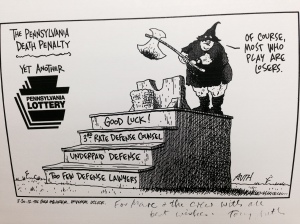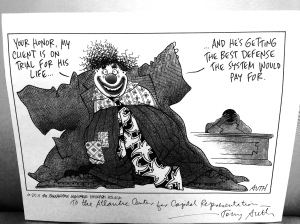Yesterday, in what can only be described as a sea change election, Lawrence Krasner won the Democratic primary for the next district attorney in Philadelphia. While his victory in November is far from assured, he will surely be the favorite, and with continued vigilance should take over as the top law enforcement official in the city in January.
No doubt there will be a tendency to view this election as a fluke, an off-year, low turnout (but not that low!) affair fueled by the outrages of Trump and company. And indeed it is reasonable to think that the stars aligned on May 16th. But you would be wrong to see Krasner’s emergence as some lucky confluence of factors beyond his control. This result was a long time coming.
The Inquirer quoted Krasner in post-election jubilation joking that his position on capital punishment had been described as “political suicide.” While some might have felt this way, such thinking is the equivalent of Trump’s claim that coal will once again emerge as our leading source of energy. Forgive the mashing of two great song lyrics into one sentence, but the times they are a changing, and we won’t get fooled again.
Krasner’s victory is no more anachronistic than Governor Wolf’s death penalty moratorium. Both flowed naturally from the knowledge – long hidden, then long denied – that our justice system was not working properly. Krasner properly noted four important facts: Philadelphia leads the country in death penalty reversals, resulting in terrible unfairness to victim and inmate families alike; the entirety of the northeastern part of the United States has abandoned capital punishment (New Hampshire, the last outlier, has a single person on its death row); Pennsylvania has not executed anyone against his will since 1962; and, finally, all of these capital prosecutions and reversals cost the taxpayers an incredible amount of money. In short, it would have been political suicide to continue supporting this error-plagued and wasteful system.
As the late great Justice Brennan cogently pointed out in dissent when the majority brushed aside profound evidence of racism, we have a fear of “too much justice.” If we acknowledge race discrimination permeates capital cases, then how do we deny that it permeates all criminal cases? If we concede that indigent defense is badly underfunded, how do we find the money that a fair justice system needs? If we recognize that our detectives are coercing confessions that may prove false and identifications that might be erroneous, how do we have confidence in our results?
There are no easy solutions to these problems, but the first step, like any intervention, is understanding that these are problems. This is what happened yesterday, and Krasner was the emissary. His message is everyone’s message: We’re not going to keep pouring money down the bottomless black hole of capital punishment. We’re not going to continue the absurdly high incarceration rate of communities of color. We’re not going to seek the highest charge and maximum sentence simply because we can. We’re not going to waste huge amounts of money so that self-aggrandizing politicians can promote themselves to higher office. In short, we’re not going to be fooled again.

